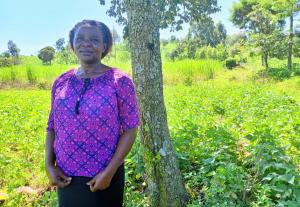Switch away from tobacco an economic, health boon for Kenyan farmers
Brazzaville – When small-scale Kenyan farmer Nancy Achieng made the switch from tobacco farming to high-iron beans just over a year ago, she joined the ranks of hundreds of her peers who today are collectively earning annual net incomes six times higher than previously.
Alongside the fact that Achieng reveals that she no longer has to be embarrassed about overdue school fees, she says she and her three children are also much healthier, experiencing far fewer respiratory illnesses than when the family farmed tobacco.
The Tobacco Free Farms initiative, a joint initiative of World Health Organization (WHO), the World Food Programme (WFP), and the Food and Agriculture Organization of the United Nations (FAO), in collaboration with the Kenyan government, was launched in Migori county in Kenya in March 2022, and is now set to be extended to Zambia.
Aligning with the theme of World No Tobacco Day 2023, Grow Food, not Tobacco, the project supports farmers to make the shift from tobacco to sustainable food crops. United Nations agencies and the Kenyan government supported with training of farmers, supply of quality inputs such as seeds and fertilizers, and a ready market for the produce, through the World Food Programme’s (WFP’s) local procurement initiatives.
Now active for three growing seasons, the project has successfully supported close to 1700 farmers, covering nearly 1500 acres of land, to make the switch. Over 620 tons of the high-iron beans have been sold to date, excluding the pending current harvest.
Thought for Food, the world's pioneer in next-generation innovation and start-up acceleration, has also invested in seed bulking for beans, supporting farmers to multiply seeds for use in the next season.
Achieng can attest to the fact that despite tobacco being touted as a highly profitable cash crop, farmers struggle to break even once their monthly debts for seed and fertilisers are repaid. “We never had anything left at all, but now things have changed dramatically. My family is much more economically stable, and my eldest son is now even attending university.”
A cost-benefit analysis per acre shows that while gross revenue is nearly three times higher for tobacco than for Nyota beans, net income paints an entirely different picture. Net annual income is more than six times higher for beans than for tobacco, and more than three times higher per season.
Other benefits of bean farming registered in the analysis include reduced use of nitrogen fertilizer, savings on vegetables for the families and on animal feed, along with improved household health.
In Africa, says Dr William Maina, WHO Africa Technical Officer for Tobacco Control and Reduction of other Noncommunicable Disease Risk Factors, World Bank estimates are that 140 million people face acute food insecurity.
Yet more than 1.2 million acres of land across 15 African countries is being used to grow tobacco – which is responsible for 8 million deaths globally every year. In Kenya, about 36 000 farmers produce tobacco leaf on around 15 000 acres of land, primarily in western Kenya and mostly in Migori.
“The success of the Tobacco Free Farms initiative in Kenya, supporting farmers to grow food instead of tobacco, is proof that we can make the switch, not only raising incomes and improving livelihoods, but also eliminating the associated health risks posed by exposure to nicotine, pesticides and tobacco dust,” he says, adding that the initiative will be expanded to a total 5000 farmers in Kenya and Zambia.
The project is currently being expanded to include three new tobacco-growing counties in Kenya – Meru, Busia, and Bungoma, with about 347 farmers with 227 acres in the three counties already transitioned from tobacco farming to growing beans.
At a special event in Kenya to mark World No Tobacco Day today, another woman farmer, Sprina Robi Chacha, is being recognized for not only making the switch from tobacco to high protein beans, but also for training hundreds of other farmers to follow suit, so creating a healthier community.
Chacha is among four individuals and two African institutions to win WHO World No Tobacco Day 2023 awards. The others are Dr Edwin Gorataone Dikoloti, Botswana’s Minister of Health; Omar Badjie, national focal person for tobacco control in Gambia; Anthony Muthemba, head of Nairobi City County’s Tobacco Control Enforcement Unit in Kenya; the Migori county government in Kenya; and Sierra Leone’s Ministry of Health and Sanitation.
